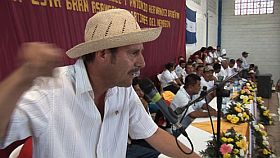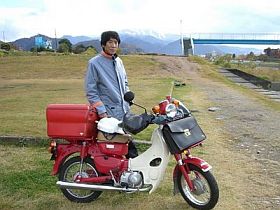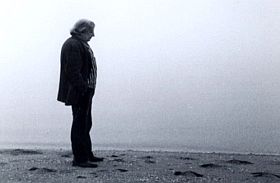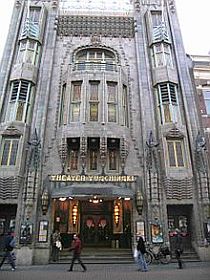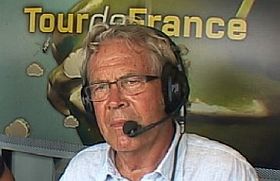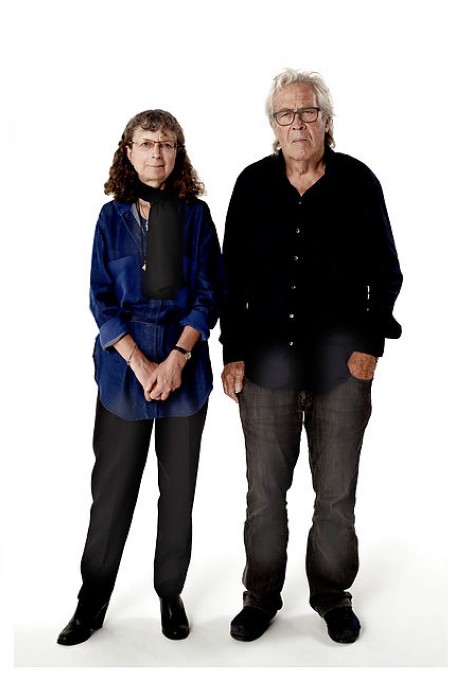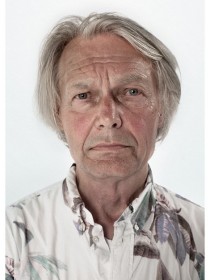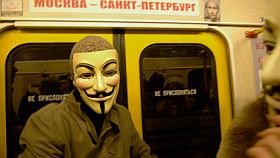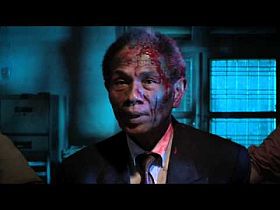… the Danish director, who has been an inspiration for generations of Danish filmmakers. With Lars von Trier as number one as readers will know from the film”The Five Obstructions”. (Tue Steen Müller)
TIL LYKKE MED FØDSELSDAGEN
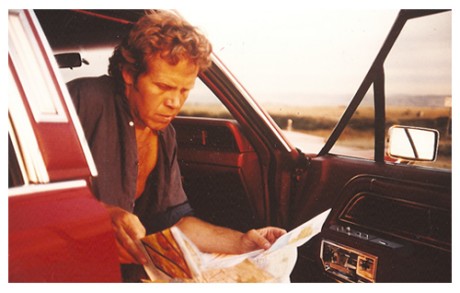
… ønsker vi her fra Filmkommentaren. Vi gør det med et af vores yndlingsportrætter af dig, det er godt nok dit, fra din blog, men vi tilegner os det lige, for det er et af de mest inspirerende, et af dem hvor du er på arbejde. Og så vil vi bare endnu engang henvise til det, vi gennem nogle år har skrevet om dig og dine film, mest om filmene i vores rå opsummering ”Jørgen Leth – Collected Texts on his Works”, som begynder med en lille kursiv …the Danish director, who has been an inspiration for generations of Danish filmmakers. With Lars von Trier as number one as readers will know from the film”The Five Obstructions” og så (dengang red.) fortsætter med første post, som er et af mine mange dagbogsnotater på bloggen: “Mid wednes(day) off from Copenhagen with troubled SAS to Amsterdam to attend the 25th idfa (International Documentary Film Festival). On board is also Jørgen Leth on his way to idfa as several times before. This year to be in the main jury with (among others) Michael Glawogger, and to attend his own ”My Name is Jørgen Leth” exhibition that is part of the idfa ”Expanding Documentary” that opens at 7pm tomorrow November 15th at De Brakke Grond here in Amsterdam…” Og så igen tillykke og hav en dejlig aften! Allan og Tue (Blogpost 14-06-2016 by Tue Steen Müller)
LYRIKPORTEN (2016)
Det må med dette filmværk være tror jeg, som Dan Turell skrev i en foranstillet note i Jørgen Leths Filmmaskinen (1979) om den bog: ”Når disse filmscener udsendes sammenfattet uden fortællestemme er det fordi klipperen ansér dem for en film og én film, en film om tekst, en næsten besværgende fortsat rullende film om tekstens muligheder. Denne film er nært knyttet til en omfattende tekstlig praksis, men er dog lige fuldt en film der lader sig se – og faktisk opleve tekstlig – på sine egne præmisser, så sandt som Jørgen Leth er så tekstlig en filminstruktør som så filmisk en digter.” (Altså frit afskrevet spejlvendt efter Dan Turèll)
Og FILMKOMMENTAREN lader således Jørgen Leth igen på en hvid baggrund og tilsyneladende intet andet præsentere denne dags digter Marianne Larsen, som i den faste lille q&a taler om ”at være opmærksom med det sprog man har i sig” og i oplæsningen som en bonus forærer os nye ord som særmandage, menskagtigheder og tiltågede skibe:
http://28danskedigtere.gyldendal.dk/#show/c0e07b88-efd1-485b-acff-1f7848b24c9c
Jørgen Leth: Lyrikporten – 28 danske digtere, Danmark, 2015. 28 kortfilm, i alt cirka 280 min., Gyldendal http://28danskedigtere.gyldendal.dk/#
http://www.dfi.dk/faktaomfilm/film/da/96521.aspx?id=96521
(Blogindlæg 18-05-2016 ABN)
LYRIKPORTEN THOMAS BOBERG
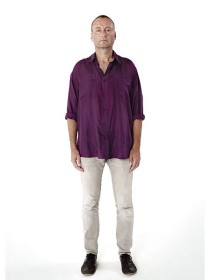
Det er på en måde Henning Camre, som har bestemt scenografien. Det er så beslutsomt med dette tilsyneladende absolut minimale setdesign. Det skal findes på, men én gang etableret kan det ses som en selvfølgelighed, når det der filmes er digte. Se nu her, Thomas Bobergs ord, linjer og tekster fylder det hvide tomme lærred omkring sig med mangefarvede ting, scener og landskaber. Der males helt ud i hjørnerne.
FILMKOMMENTAREN lader således Jørgen Leth igen på en hvid baggrund og intet andet præsentere denne dags digter Thomas Boberg:
http://28danskedigtere.gyldendal.dk/#show/388a5362-a170-4203-bc76-33abe4ef1785
(Blogindlæg 15-05-2016 ABN)
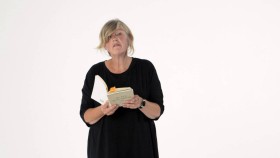
Der er altid regler, så efter oplæsningen skal digteren besvare spørgsmål, jeg ved endnu ikke om det er to hver gang, men Pia Juul svarer Jørgen Leth på disse, hvorfor skriver du digte og hvad kan få dig til at skrive digte. Til det sidste siger hun: ”… det er det knæk der er i Kaalundsgade og det er der hvor Art Taylor banker på i Giant Steps, det er vinden og vejret.”
Men først oplæsningen, FILMKOMMENTAREN lader Jørgen Leth præsentere denne dags digter Pia Juul:
http://28danskedigtere.gyldendal.dk/#show/c7290e00-a132-4804-8ad6-751e5e5fa957
(Blogindlæg 14-05-2016 ABN)
LYRIKPORTEN PETER LAUGESEN
Filmvisningerne i CINEMATEKET i København med digtoplæsningerne næsten nonstop har
har ENDNU NOGLE DAGE FREM TIL 17. MAJ. Digtere fra tre generationer læser deres digte, fortæller, hvorfor de digter, og hvad der sætter et digt i gang hos dem.
Det foregår i Bio Benjamin, den lille biografsal bag Restaurant Sult, hvor der også efter 17. maj vises danske film nonstop tirsdag til søndag i tidsrummet kl. 16:15-22 (fredage 17:15-22). Der er ingen pladsreservation; man kan frit komme og gå og forestillingerne er gratis. Til gengæld er visningerne ikke programlagt til bestemte klokkeslæt. Bemærk at biografen lukker kl. 22, også selvom den sidst viste film endnu ikke er slut.
Men Jørgen Leths Lyrikporten – 28 danske digtere ruller i sløjfe i Walk-in-Bio fra 27. april til 17. maj.
Imidlertid er det er jo i København, så her på FILMKOMMENTAREN lader vi Jørgen Leth præsentere denne dags digter Peter Laugesen:
http://28danskedigtere.gyldendal.dk/#show/271d0aec-56f4-47e9-94a7-d726b6a01ab9 (streaming af filmen med Peter Laugesen)
(Blogindlæg 13-05-2016 ABN)
LYRIKPORTEN LEA MARIE LØPPENTHIN
DOCALLIANCE 2012

To be repeated:
You can watch 7 of Jørgen Leth’s films for free on the vod Docalliance (link below), a – too use one of the director’s favourite words – generous offer to film lovers all over to see ”A Sunday in Hell” (Paris-Roubaix race), ”Moments of Play”, ”Good and Evil”, ”Notes of Love”, ”66 Scenes from America”, ”Haiti Untitled” and ”The Perfect Human”. A small festival in itself with the usual high quality text intros from the Docalliance people. For free until November 25. A must for all film students! And cinéphiles of course.
To be added:
You are now also invited to watch Truls Lie 2012, director’s cut version of his “The Seduced Human”, 70 mins. long, reviewed on this blog by Allan Berg, in Danish. Here is the intro from DocAlliance:
“What is the meaning of a whole life lived as an observer?
Danish filmmaker Jørgen Leth has lived in chaotic Haiti for 20 years. In 2010 the catastrophic earthquake changed his life. Was it a turn from aesthetics to ethics?
This documentary follows Jørgen while he is making his last film Erotic Man in Haiti before the earthquake, all the way up to its premiere. Jørgen also looks back at his films made over 40 years – like The Perfect Human, Life in Denmark, Play, Notes on Love, Good and Evil, Haiti Express, 66 Scenes From America, and his work with Lars von Trier called Five Obstructions. But not least, this inquiry asks how an artist lives existentially with desire, doubt and despair – the three fundamental concepts in the philosophy of Søren Kierkegaard.” (Blogpost 22-11-2012 by Tue Steen Müller)
IDFA
Mid wednes(day) off from Copenhagen with troubled SAS to Amsterdam to attend the 25th idfa (International Documentary Film Festival). On board is also Jørgen Leth on his way to idfa as several times before. This year to be in the main jury with (among others) Michael Glawogger, and to attend his own ”My Name is Jørgen Leth” exhibition that is part of the idfa ”Expanding Documentary” that opens at 7pm tomorrow November 15th at De Brakke Grond here in Amsterdam.
The exhibition that ran succesfully in Copenhagen – arranged by Danish curator Michael Thouber at the Kunstforeningen Gl. Strand in Copenhagen – gives the visitors the chance to watch (some of) Leth’s films, photos, notebooks as well as listening to his commentating bicycling races like Tour de France. One of the many characteristics of the director, who in the car from Schiphol to the hotel immediately fell into discussions about this one of many passions of the Danish director, who has been an inspiration for generations of Danish filmmakers. With Lars von Trier as number one as readers will know from the film ”The Five Obstructions”.
Which leads to the most important information: You can watch 7 of Jørgen Leth’s films for free on the vod Docalliance (link below), a – too use one of the director’s favourite words – generous offer to film lovers all over to see ”A Sunday in Hell” (Paris-Roubaix race) (PHOTO), ”Moments of Play”, ”Good and Evil”, ”Notes of Love”, ”66 Scenes from America”, ”Haiti Untitled” and ”The Perfect Human”. A small festival in itself with the usual high quality text intros from the Docalliance people. For free until November 25. A must for all film students! And cinéphiles of course!
www.lethfilm.dk
http://dafilms.com/
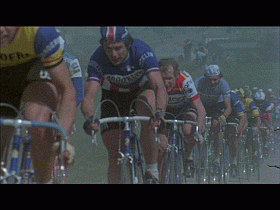
JØRGEN LETH – MASTER OF DOX
This is how Danish veteran Leth is characterised on the site of ZagrebDox (February 27 – March 6, 2011) in a quite interesting intro text, that also has a greeting to what is called Danish puritans:
“Can ‘eroticism’ be measured? Can it be limited or defined? In his latest film, one of the most significant documentary filmmakers of today, 73-year-old Jørgen Leth (‘The Perfect Human’, ‘The Five Obstructions’) travelled from North Africa to Rio in order to register the form and sense of eroticism, refusing to accept it as a part of the dominant currents of new Puritanism and/or commercialised video-style eroticism of ‘fake breasts and backsides’.
Quite predictably, Leth’s sensual, poetic and unbiased exploration of human eroticism, created during the course of ten years, was harshly criticised by reviewers (The Variety describes Leth’s accomplishment as shameful) and Danish puritans, calling the author ‘controversial’. Another unfavourable element was the fact that Leth, as an honorary ambassador to Haiti, was involved in an intimate relationship with his cook’s under-age daughter, describing the episode in his memoirs ‘Imperfect Man’ and causing great controversy in Denmark.” (Tue Steen Müller 13-02-2011)
DET EROTISKE MENNESKE (2010)

Titlen leder i første omgang på vildspor. Den leder mænd og nok især kvinder på vildspor. Foromtale og stills hjælper til: man forventer penis og bryster. Og så er det sådan, at kun mændene får deres syn for sagn, ovenikøbet i en ren overdådighed af bare bryster, mens kvinderne tilsyneladende snydes, der er ikke antydning af penis i den film, ikke skyggen af en tilsvarende fremvisning. Imidlertid, efter den første skuffelse, indser kvinderne, at alle disse fraværende smukke og veludstyrede mænd i filmen lever og ses i de utallige nærværende kvinders blik, instrueret som kvinderne er – vel at mærke inde i filmens dialog – til at samle deres tanker og koncentration om den dejligste mand i deres fortid. Hver deres dejligste mand. Det er ansporet af denne erindring, synlig i blikkene mod kameraet, at brystvorterne erigerer.
Psykologens kommentar er tilsvarende opmærksom. Det ses, at Jørgen Leth både som filmens hovedperson og som dens instruktør er begejstret for netop de kvinder, som er begejstret for ham. Som menneske søger han bekræftelse hos disse kvinder. Han lever den usikre eksistentielle situation, et kærlighedstab engang, og kompenserer ved en midlertidig situation af lykke, kvindens accept i som regel korte, enkelte gange lidt længere, øjeblikke af værdsathed. Føler sig begæret, er begæret. Som et erotisk menneske. Denne udsathed er det erotiske menneskes virkelighed.
I en overvældende ærlighed og præcis u-selvhøjtidelighed, befriende muntert ind imellem, lægger filmen disse kort på bordet. Det måtte jo komme, stikket. (Nej, det er ikke det sidste). I tekst efter tekst, film efter film havde Leth ved sine udspil denne årrække fået os til at ane, hvad der sad på hånden. Jørgen Leth lader som om, intet er sket i mellemtiden, han placerer ikke sin film i den offentlige debat, i sladderens verden af karaktermord, men fortsætter det arbejde, som hele tiden har ligget i det poetiske værk. Opfylder kravene her: der er dette at gøre, og så dette. Og han bliver ikke klogere, vi bliver ikke klogere, men eftersøgningen fortsætter.
Udenrigskorrespondenten fandt ikke kvinden igen, men smed skjorten og gav sig til at danse med drengene, stemmen fandt ikke Traberg, men vi så ham og og forstod ham måske, de to sammenklippede filmhold fandt ikke kærligheden, men lavede umistelige notater, fandt antropologen Malinowskis verden, og hans bog blev herefter selve bogen for instruktøren og ekspeditionslederen. Det fortalte han forleden på et seminar på universitetet i Aarhus, eftersøgningen var fortsat, og den nye film var omsider færdig.
Det erotiske menneske griber igen og igen tilbage i det samlede værk. Men gentagelsen er naturnødvendigt ny hver gang. Det gentagne tegner sig i nyt lys i nye omgivelser. Den haitianske digters tekst opstod, som hun sad på balkonen på hotellet i Haiti, uden titel (1996), den udfoldede sig i vemodigt kommenterende omgivelser i bogen Historier fra Haiti (2000) og fremtræder nu i tre forskellige variationer læst af andre kvinder, forbundet med andre kvinder, lagt ind i andre levede liv.
Optagelserne fra castingen, nærbilledet af håndens notat med to stjerner, ind imellem en ekstra stjerne i parentes, må være en nøglescene: ingen af de mulige medvirkende kasseres, alle har deres skønhed, alle har deres historie, og filmens generøsitet kan indlemme dem alle i en sekvens af total forståelse og accept. Det er også det billede, Per Kirkeby har valgt til sin plakat. Men spejlscenen med samtalen med kæresten Dorothie kombineret med optagelsen fra dengang af Dorothies ansigt under et af samlejerne i deres deres liv sammen, er selve omdrejningspunktet. Her dementeres alle falske rygter uden videre og uden at forstyrre det nye mødes fortrolighed, her bekræftes den pagt, de havde, her understreges deres fælles forståelse af deres relations grundlag. Sådan. Og forståelsen af de mange kvinders blikkes fokusering af hver deres mand i fortiden samles i Dorothies blik den bestemte dag, netop det øjeblik, da netop han var i hendes fokus, var hendes mand.
Jørgen Leth: Det erotiske menneske, Danmark 2010, 85 min. Manuskript: Jørgen Leth, fotografi: Dan Holmberg, Adam Philp og Alexander Gruszynski, klip: Camilla Skousen og Morten Højbjerg, musik: Kristian Leth og Fridolin Nordsø, produktion: Nordisk Film og Zentropa ved Marianne Christensen, Lars von Trier og Peter Aalbæk Jensen. Premiere i dag på CPH:DOX og simultant i en række biografer knyttet til DOX:BIO. (Allan Berg Nielsen 03-11-2012)

BOX COLLECTION COMPLETED
1st of October 2009 is the day where the 6th and final box of films by Danish film icon Jørgen Leth is published. The collection, administered and published by the Danish Film Institute, though financed primarily by a private investor, is an exemplarily well composed piece of publishing, in this case – box 6 – with his experimental film from the 1960’es and 70’es plus 5 hours of bonus material and a teaser from his coming The Erotic Human.
English subtitles and a booklet accompanies the box. The book- and filmshop at the Danish Film House http://www.dfi.dk/shop sells the complete collection. (TSM 23-09-2009)
COMEBACK
This is a brief hommage to Jørgen Leth, the Danish documentary filmmaker, who this year has made a comeback to be the TV2 Tour de France commentator. In Danish:
Så sad jeg der igen det meste af søndag eftermiddag foran skærmen og ventede på, at noget skulle ske på den Tourmalet bjergetape, som normalt rummer de mest dramatiske udbrud og indbyrdes kampe. Intet skete, det var kedeligt bortset fra spurten, som var klassisk – to mand tilbage, den ene lægger sig i baghjul, den anden går frem, og så går den ene frem igen og vinder. Voila, men der var skuffende lidt aktivitet, som Jørgen Leth sagde flere gange. Og det er på grund af ham, at lidt cykelløb havner på filmkommentaren.dk. For hvilken fornøjelse det er at have Jørgen Leth tilbage ved mikrofonen. En mand der mestrer sproget, kommentaren til billederne, nogle gange nøgtern, nogle gange lyrisk og altid præcis, og hvilken fryd det er, når han lader sig rive med: det er altså et flot billede, det der – siger han ligefremt, og han og reporteren tier stille, mens de glidende helikopterbilleder fra Pyrenæerne rammer øjnene. Eller når en anden cadeau tildeles motorcykelfotograferne, af en filmmand, en kender, der taler værdigt om ”den uudgrundelige Lance Armstrong”, og græmmes over den ”sjofle” behandling, som den franske presse giver amerikaneren, der som Leth er vendt tilbage. Tak!
ANDY WARHOL
Så mødte jeg ham igen, Andy Warhol (1928-1987). I Edinburgh, i forbindelse med den skotske hovedstads kæmpemæssige Festival for bøger, musik, gadeoptræden, kunst og film. Der var han, det var tydeligt at se på Princes Street, hvor National Gallerys søjler var blevet til Campbell’s suppedåser i overstørrelse. Indenfor hang alle hans ikonmalerier og to, tre rum, der fik mig til at tænke på vor egen mester udi pop art, Jørgen Leth. I et rum svævede Warhols “Glatte Hårdtpumpede Puder”, som er titlen på Leths digtsamling fra 1969, og i to andre rum viste skærme Warhols “Screen Tests”, som er uklippede filmiske indstillinger på ansigter, som i følge vægsteksten er “slowed down by a third” så enhver bevægelse, ethvert blink med et øje, ethvert træk om munden kan registreres. Se, her er “Det perfekte menneske”, lød det i mit hovede ved synet af disse ansigter, som Warhol rettede kameraet imod omkring 1964 . 3 år senere lavede Jørgen Leth sit mesterstykke med Claus Nissen, og mere end 40 år senere beder Lars von Trier Leth om at genskabe det perfekte menneske i “De fem benspænd”. Det må have været et stort øjeblik for Leth, da han sammen med Ole John og fotografen Dan Holmberg i 1981 fik Andy Warhol med i deres “66 Scener fra Amerika”, hvor (stakkels) Warhol spiser en burger uden at ytre et ord før til sidst: My Name is Andy Warhol, I just finished eating a burger. (TSM 21-08-2007)
THE JØRGEN LETH COLLECTION
It is a fairy tale. Could only happen in the country of Hans Christian Andersen! Danish film director, poet and journalist Jørgen Leth meets a Danish millionaire and expresses how much he would like his films to be published on dvd in the best possible technical edition. The millionaire offers his support and there you go – Jørgen Leth’s films will be available with competent booklets and English subtitles in all films in 6 dvd boxes. Thanks to the financial help of Møllehegnet Holding A/S.
2 of them have come out so far, “The Anthropological Films” and “The Sports Films”, and the third one, the travelogues, the films where Leth travels the world, will be out in a week. In the first box you will find “The Perfect Human” from 1968, in the second “Motion Picture” from 1970, and in the third “66 Scenes from America” from 1982. Just to mention 3 of his great films.
Jørgen Leth is rightfully, and not only in our small (rotten) kingdom of Denmark, considered to be one of the true masters of documentary, therefore this commercial and reason to direct you to know more about this initiative at www.dfi.dk/shop (TSM 03-04-2008)
PORTRÆTFILMENE 1
Så er boksen med film 22 til 29 kommet. Portrætfilmene. Som malede portrætter handler de nok alle om kunstneren, som maler, i hvert fald mere end om kunstneren, som sidder, står, er model. Derfor er øvelsen for mig at finde ud af hvad det så er for et materiale, hvad det er for en iagttagelse, hvad det er for en udforskning, som ligger i disse film. Og hvordan det stof føjer sig til det øvrige i det monument af en sammenhængende omverdenstolkning, som The Jørgen Leth Collection nok også, måske især udgør.
The Jørgen Leth Collection, Portrætfilmene: Klaus Rifbjerg (1974), Peter Martins – en danser (1978), At danse Bournonville (1979), Kalule (1979), Step on Silence (1981), Dansk litteratur (1989), Michael Laudrup – en fodboldspiller (1993), Jeg er levende – Søren Ulrik Thomsen, digter (1999) + bonus, Leth om Laudrup (2007). Det Danske Filminstitut 2008.(ABN 19-11-2008)
PORTRÆTFILMENE 2
Hvad er det, som holder disse skildringer sammen under den overskrift (portrætfilm), dette mærkelige ord, som bruges (efter min mening misbruges) af filmfolk i dette land. Ustandseligt. Handler de alle om personligheder? Om personlige kvaliteter? Om store præstationer? Tilsyneladende er det om dans, om digtning, om sport. Så det er noget med at træne, at yde det ypperste, at måle sig med de andre.. Stikord: tilblivelse af kunst i tanke og tekst, det perfekte menneske i kød og blod, danseren, digteren, bokseren og i mange scener instruktøren. Eller er det så meget andet også? Især noget helt andet, som ligger så forskelligt i hver enkelt unik film? For eksempel:
Klaus Rifbjerg (han sidder så selvfølgeligt og ubesværet ved sit lille skrivebord foran vinduet, helt anderledes end forfatteren i fortællingens ramme i Notater om kærligheden, dette andet jeg, som er så besværet, fortvivlet, manieret)
Peter Martins – en danser (den perfekte krop, den enestående præstation, den kødelige erotik, trænet op til brug for instruktørens tankes iscenesættelse)
Hvad er det, som holder disse skildringer sammen under den overskrift (portrætfilm), dette mærkelige ord, som bruges (efter min mening misbruges) af filmfolk i dette land. Ustandseligt. Handler de alle om personligheder? Om personlige kvaliteter? Om store præstationer? Tilsyneladende er det om dans, om digtning, om sport. Så det er noget med at træne, at yde det ypperste, at måle sig med de andre.. Stikord: tilblivelse af kunst i tanke og tekst, det perfekte menneske i kød og blod, danseren, digteren, bokseren og i mange scener instruktøren. Eller er det så meget andet også? Især noget helt andet, som ligger så forskelligt i hver enkelt unik film? For eksempel:
Klaus Rifbjerg (han sidder så selvfølgeligt og ubesværet ved sit lille skrivebord foran vinduet, helt anderledes end forfatteren i fortællingens ramme i Notater om kærligheden, dette andet jeg, som er så besværet, fortvivlet, manieret)
Peter Martins – en danser (den perfekte krop, den enestående præstation, den kødelige erotik, trænet op til brug for instruktørens tankes iscenesættelse)
At danse Bournonville (den unge hengivne kvinde, den gamle forførende mand, denne sublimering af denne komplicerede følelse i ren skønhed)
Step on Silence (dette tema med (frapperende) variationer)
Dansk litteratur (og dette tema overalt i billedgørelsen af mine læsebøger fra Svanebogen til Falkenstjerne. Jeg er ikke mere udenfor, men lukket ind i værkerne, i værket, i det beslutsomme valg: Mørk låner Kingo stemme, Laugesen lægger sin til Laugesen, som Traberg lagde krop til Traberg (i Traberg). Fra dengang til nu: rygsøjlen i det sprog, som også er mit)
Jeg er levende (.. det sprog, som så myndigt i den første scene, i dette digt, i disse filmiske omgivelser af selvfølgelig kompetence (Holmberg, Skousen, Torp, Leth) dette gamle hold, som som Annette Nørregaard kan læne sin idé med Søren Ulrik Thomsen mod, trygt. Og så forunderligt forvandles for eksempel siger og skriver to barndomserindringer til hele den fattige, men værdige landmandskultur fra Aakjær til Smærup Sørensen og så præcist rammer hver eneste scene, at de 40 minutter vider sig ud til hele litteraturen og billedkunsten om at være levende og opmærksom..)
(.. er det også det, som de sidste to portrætter vil? Kan?) Kalule og Michael Laudrup. (Når det kommer til stykket…)
Foto: Leth instruerer en scene, hvor Stanley Williams instruerer Peter Martins.
The Jørgen Leth Collection, Portrætfilmene, Klaus Rifbjerg (1974), Peter Martins – en danser (1978), At danse Bournonville (1979), Kalule (1979), Step on Silence (1981), Dansk litteratur (1989), Michael Laudrup – en fodboldspiller (1993), Jeg er levende – Søren Ulrik Thomsen, digter (1999) + bonus, Leth om Laudrup (2007). Det Danske Filminstitut 2008. (ABN 03-12-2008)
DYREHAVEN (1970)
Vi fortsætter næste uge samtalen om Per Kirkeby, nu i Mandagshøjskolen i FOF-Randers. Vi skal naturligvis igen se Pernille Bech Christensens Pers Metode (2008), men lige netop med den medvirkende vil det være naturligt og vigtigt at huske på hans næsten glemte betydning for filmkunsten. I 1970 instruerede han sammen med Jørgen Leth Dyrehaven, den romantiske skov. Det er et udgangspunkt, dels fordi filmen nu er tilgængelig på dvd i Jørgen Leths bokssæt, dels på grund af en bemærkning fra dengang af Hans-Jørgen Nielsen i hans anmeldelse i Information, 18. juni 1970 under overskriften “En meget mærkelig film”: “…Fotografen Henning Camre fejrer triumfer i disse dvælende farveorgier i harmonisk naturskønhed. Farvefilm har aldrig før været anvendt med en sådan artistisk følsomhed og teknisk overlegenhed i dansk filmproduktion. Men inden i og samtidig med disse banalt smukke og konventionelt romantiske billeder er der endnu en film. En metafilm om den umiddelbare naturfilm, der holder denne frem som en ren og skær historisk skrift. Den egentlige bedrift i så henseende er Per Kirkebys. Alle filmens billeder er totalt behersket af hans særlige måde at se på. Den er et af maleren Per Kirkebys hovedværker…” Citatet er fra Anne Hejlskov Larsens Per Kirkebys malerier 1957-1977 (2002), hvor hun blandt alt det meget andet har skrevet en komplet oversigt over Kirkebys film. Kun få af dem er umiddelbart tilgængelige, men Da myndighederne sagde stop (1972), som han instruerede sammen med Arkaluk Lynge og Asger Jorn, en film (1977) kan dog lånes på biblioteket i VHS kopi. (ABN 11-03-2011)
SANCT HANSAFTEN-SPIL (1979)
Jeg lærte i skolen, at Digte 1803 er en stor bog, måske den største i dette dengang nye århundrede, som vi er nogle, der aldrig rigtigt har forladt. Jeg hørte om samtalen med Steffens og jeg lærte Guldhornene udenad, det skulle vi. Og jeg lyttede efter, når Reumert læste digtet i radioen med musik til. Det blev en del af mig. Men jeg forstod det ikke. Først nu tror jeg, at jeg forstår. Lidt.
Tænk, at det er Jørgen Leth og Per Kirkeby – som i mellemtiden har betydet så meget for mig – og de kongelige skuespillere, som omsider (jeg så aldig tv-produktionen, og havde dengang i 79 bestemt ikke kunnet tage den ind..) at de viser mig, hvordan og hvorfor, den bog er stor. Og gør min dansklærers arbejde færdigt. Det var Thure Munkholms korte analyse, som bragte mig på sporet. Bare sætningen: “… Oehlenschlägers sprog, der her toner frem i al dets overvældende skønhed og metriske vidskab.” Altså! Metriske vildskab…
Og blide smerte: “… Jeg har jo alt elsket og levet!” Synger Maria ved klaveret, og Konen siger: “Deres Stemme har dog en herlig Klang. / Hvad hedder den Arie? / Maria svarer: Teklas Sang. / Den er oversat efter tydsk Poesi / til Weyses deilige Melodie.” Og jeg tilføjer: og Henning Christiansens gribende melodi til jødedrengens sang: “… Kommer at kiöbe, kommer at kiöbe! / Röde, gule, grönne og blaa i Fleng! / Jeg er en god lille Jödedreng!” Og Frits Helmuths fortælling om liden Kirsten: “… I gamle, længst forsvundne Tid / der var en deilig Pige..” Og Ove Sprogøes blinde mand: “Skaffer mig min Fiol igien, / at jeg kan tolke min stumme Smerte.”
Alt dette ustandseligt afbrudt af den fineste ironi og klassiske lystighed: “De Gravhöie skulde Fanden flytte! / De staae her og giör ikke den mindste Nytte.” Tekstens første og berømte chok. Institutionen Leth og Kirkeby og Christiansen har med hele holdet anvendt dette tydelige set-up fra digteren og omsat det i tv’s letteste og simpleste greb og gjort det til noget så enestående som tv-kunst af munter alvor. (ABN 20-09-2008)
UDENRIGSKORRESPONDENTEN (1983)
Jeg mener ikke, jeg har set filmen siden den var ny. 25 år er gået. Og man spørger naturligvis: holder den? Og jeg svarer lige med det samme efter at have set DVD-versionen: Om den holder! Omsider en ligetil og tydelig film. En klog og smuk kærlighedsfilm. En gennemført Leth-film, så genkendelig. Måske falder den lidt sammen til sidst, det må undersøges nærmere, men til da: Ja, hvor den holder.
Gensynet er fantastisk, filmen er meget bedre, end jeg husker den. Igen er der det med den anden uskyld, at glemme alt det, jeg ved om filmen på forhånd, om Haiti og om Leth og hans bøger og andre film, og opleve filmen igen i en tømt tilstand af både forståelse og oplevelse, som er værkets mening og hensigt, som Poul Borum sagde.
Der er i den situation meget at glemme, for der har været meget siden. Hans “Haiti, uden titel” først og fremmest og “Traberg” jo, og Asger Leths “The Ghosts of Cité Soleil”. Den politiske udvikling i landet, kup og krige. Alle artklerne og bøgerne. Det ville ikke være Jørgen Leths skyld, hvis jeg ikke genkendte stederne og personerne og begivenhederne. Med alt det stof glemt, men husket et andet sted i systemet, er det, at alt i den 25 år gamle film er tydeligt og ligetil. “Det lignede en erindring, dette sted,” som Traberg siger et sted i den film, hvor alt også er så velkendt. (ABN 18-09-2008)
NOTATER OM KÆRLIGHEDEN (1989)
I morgen aften skal vi se en gammel Jørgen Leth film i min filmklub. Jeg har prøvet at forberede mig. Det kan jeg ikke, jeg farer vild, eller det mærkes som om jeg gør det. Landskaberne og opstillingerne fører tilsyneladende så mange steder hen. Som hele tiden ligner det forrige. Men jeg tager fejl, imidlertid tager jeg fejl. Der er forskydninger, små umærkelige ændringer. Det er ikke blot smukke postkort med tekst bagpå vist efter hinanden (selv om det for så vidt havde været fint nok, når fotograferne er Henning Camre og Dan Holmberg, og det er Jørgen Leth, som har skrevet de korte tekster, som hører til), nej der er en evig kadance, en stigning i intensitet, viden og overblik, små fald og stigninger undervejs (det er skam levende dette) men generelt en ubrydelig udvikling frem mod en stor tilfredsstillelse: klogskab og skønhed forenet i en fejlfri film.
I aften skal vi se en gammel Jørgen Leth film. Jeg har prøvet at forberede mig. Det kunne jeg ikke, jeg for vild, eller det mærkedes som om, jeg gjorde det, da jeg så filmen igennem. Landskaberne og opstillingerne fører tilsyneladende så mange steder hen. Som hele tiden ligner det forrige. Jeg tog fejl… Imidlertid tog jeg fejl. Der er forskydninger, små umærkelige ændringer. Det er ikke blot smukke postkort med tekst bagpå vist efter hinanden (selv om det for så vidt havde været fint nok, når fotograferne er Henning Camre og Dan Holmberg, og det er Jørgen Leth, som har skrevet de korte tekster, som hører til), nej der er en evig kadance, en stigning i intensitet, viden og overblik, små fald og stigninger undervejs (det er skam levende dette) men generelt en ubrydelig udvikling frem mod en stor tilfredsstillelse: klogskab og skønhed forenet i en fejlfri film.
Filmen, vi skal se er Notater om kærligheden fra 1989 som jeg har valgt, nu vi venter på Det erotiske menneske, som blev forsinket af al balladen. Der var også ballade for tyve år siden. Jørgen Leth var også dengang sin egen, han lavede ikke de andres film, ikke de film man ønskede, han lavede igen sin egen film, og som Lasse Ellegård bagefter skrev “…rygtet løb i forvejen. Jørgen Leth har lavet en filmatisering af sit privatliv, lød meldingerne i miljøet. Kritikken var varskoet. Og dommen faldt med forudsigelig præcision. En enig dagbladskritik var unison. Den så kun Notater om kærligheden som det endegyldige udtryk for instruktørens manierede krukkeri, hans narcissistiske selvspejling, hans patetiske privatisme.”
Lasse Ellegaard ser noget helt andet. Han ser den antropologiske film: “… I Notater om kærligheden rendyrker han sit udtryk, som er afsøgning af overflader, signalementer af konkrete ting og handlinger. Hans udfordring har været at konkretisere en følelse, men den største følelse af alle: Kærligheden.” Ellegaard sammenfatter i sin overskrift “en mesterlig film.” Jeg er fuldstændig enig.
CITATSAMLING TIL FILMAFTENEN
Den anden uskyld Poul Borum: Poetisk Modernisme, 1966. (Stykket har jeg ændret, så det fra at handle om tekster her handler om film): “Det trænede filmpublikums ideelle dvd-gennemsyn og arbejde med filmen bør se således ud: 1) opleve filmen umiddelbart og uhildet, 2) nærme sig filmen fra så mange sider som man kan overkomme og med så megen viden og indsigt som muligt – den eneste gyldige metode er den pluralistiske – dvs. at forstå og vurdere alle detaljer og deres sammenhænge og helheder: filmens billede og lyd, dens ord, dens locations og personer, afsnit og scener, dens motiv og holdning og genre, dens helhed – og filmens placering midt i sine kontekster, trådene ud til psykologiske, sociale, historiske, litterære og filmiske sammenhænge, alt det tidsbetingede i den tidløse enestående film. 3) Når dette er nok, da: at glemme det hele og opleve filmen igen, i dén anden uskyld som er både forståelse og oplevelse, som er kunstværkets mening og hensigt…”
(Som altid, når jeg er forvirret følger jeg strikt Borums gamle opskrift. Og her er så lidt til en begyndelse på at nærme sig filmen fra så mange sider som jeg har kunnet nå til nu…)
MALINOWSKI ER MIN HELT
Den Store Danske Encyklopædi: “Mali’nowski, BronisHaw, [-gNCf-], 1884-1942, polsk-britisk antropolog. Under sit ophold på øgruppen Trobrianderne ved Ny Guinea under 1. Verdenskrig udviklede Malinowski feltarbejdet som antropologisk metode. Han lagde vægt på deltagerobservation, hvor forskeren i længere tid lever i det udforskede samfund og deltager i det daglige liv. Hans vigtigste værker beskriver øhavets handelssystem kula, trobriandernes seksualliv og deres havebrug. Han vendte sig mod kulturhistoriske teorier og var fortaler for funktionalismen. For ham bestod et samfund som trobriandernes af en række institutioner som fx ritualer, ægteskab og kula. Deres funktion opfattede han på to måder: Dels bidrog de til at vedligeholde samfundet som helhed, dels opfyldte de den enkeltes behov. Hans teorier inspirerer ikke længere antropologien, men hans feltmetode værdsættes stadig.”
(… i hvert fald må jeg vide lidt mere om denne Malinowski, hvis fotografier indgår, som selv er på billederne, som Jørgen Leth beundrer siden han læste antropologi på universitetet hos professor Johannes Nicolaisen)
SELVISCENESÆTTELSE
Søren Birkvad: Verden er Leth, 1992: “… Billederne af naturbefolkningen på New Guinea, der glimtvis dukker op som små portrætarrangementer af indfødte, der pynter og smører sig, ryger og spiser, er efter min mening lovlig tæt på den voyeuristiske overfladiskhed, man kender fra safari-serier i mondæne magasiner. I samme forbindelse virker Leths selviscenesættelse som negerinstruktør i khakifarvet Stanley-dress som en (tilsigtet?) perspektivforkortelse: det er som vanligt det han gør ved stedet, mere end stedet selv, vi fæster os ved. De mange scener med filmfolk, der filmer sig selv filme, er sigende: filmen handler om en film, der ikke kan samle sig om noget andet end sit eget forsøg på at blive til.”
(… og filmvidenskabsmanden er om muligt i sin fremstilling næsten mere perfid end anmelderne)
Institutionens funktion Den Store Danske Encyklopædi: “Funktionalistisk antropologi. Funktionalismen har fra 1920’erne til 1950’erne især præget britisk socialantropologi. Den blev her udviklet af B. Malinowski og A.R. Radcliffe-Brown, som begge var påvirket af É. Durkheim. De fremhævede studiet af elementer i deres samtidige sammenhæng i modsætning til det historiske studium af deres oprindelse og spredning. Begge betragtede fænomener som integreret i en større helhed. For Malinowski var en institutions funktion dens bidrag til tilfredsstillelsen af menneskelige behov.”
(… Jeg tror dette er et strejflys på instruktørens teoretiske fundament, støbt på studiet før marxisterne ankom.)
MENNESKER SOM JEG SÆTTER HØJT
Max Kestner i Ekko 38/2007: …En anderledes tung stemning finder man i Notater om kærligheden. Jeg ved, at mennesker, som jeg sætter højt, holder meget af den film, men den er ikke øverst på min liste.
(… Leths meget yngre kollega og humorist foretrækker altså de morsomme film i dvd-boksen, Det perfekte menneske og De fem benspænd). Se, det her kan jo fortsættes. Og så glemmer man det hele og ser filmen i en ny uskyld. (ABN 25-11-2008)
TRABERG (1992)
Jeg holder med, når jeg ser film. En af dem. Sådan har det altid været. Og nu holder jeg med Traberg. Ikke med stemmen. Erik Mørks, som fortæller om sin ven på fotografiet i det første filmbillede. Jeg holder med ‘Traberg som Traberg’ som der står på forteksten. Næste billede: en ung sort mand synger for. Nærbillede. Afrikansk musik, vi er i Haiti, uden tvivl. Og så er vi i Spanien, i en sportshal, hvor mænd på gulvet spiller op ad væggen. Mænd på stolerækker spiller. Om penge. Stemmen fortæller mig nødtørftigt om Traberg, som jeg nu ser der på stolen i hallen. Nær, energisk, til stede. Han er en mand, som bevæger sig fra sted til sted, fortæller stemmen, og den vil følge hans spor, for han må være forsvundet.
Sporet går til en lille spansk by, kameraet over de vidunderlige tegltage. Lyden er en skrivemaskine. Så ser jeg værelset, han er der ikke, men hans ting er der: skrivemaskinen, bøger og avisudklip. Stof om Haiti, et land i indbyrdes krig. Jeg ser tagene ud af vinduet. Det bliver sort, Trabergs hænder trækker skodderne for. I sin støvede 2 CV er han atter på rejse ad en ensom landevej i det vældige landskab. Alle elementer i filmen er på plads, nu følger jeg Traberg. Ham holder jeg med. Det er elementært.
Det er en stor film. Den samler flere af Filmens traditioner. Det er en surrealistisk film. Man kommer til at tænke på Buñuels ‘l’Age d’Or’ fra 1930, som handler om Roms grundlæggelse, statsmagten, banditter, borgerskab og et seksuelt-sadistisk præsteskabs kristendom. Alt kan ske i denne film, fordi alt kan ske i virkeligheden. Der er så mange logikker, der insisterer på at være reelle. Der er mange logikker, der er faktiske, og som mennesket får gennemført. Det er sjældent, at en film giver plads til dem alle. L’Age d’Or gjorde. Traberg gør. (Mogens Rukov i Information 19.12.1992).
Danmark, 1992. Plakat: Per Kirkeby
DVD-boksen “Fiktioner”, hvor Traberg er med, skulle udkomme i overmorgen. Den er blevet forsinket nogle dage, siger min boghandel. Jeg glæder mig vildt til at se Traberg igen, og Udenrigskorrespondenten igen.
TRABERG 2
Jeg tror den kommer i overmorgen! En af mine yndlingsfilm, måske afgjort min favorit, Jørgen Leths Traberg er på vej. DVD-boksen, hvor den er sammen med to andre Lethfilm, har været forsinket. Min boghandler har et par gange ringet til forlaget, som kun kan sige, at der er problemer, en anden gang er de allesammen til frokost. Det er afslappet som Haiti, helt rent i stilen. Jeg venter et par dage mere. Læser lige igen i Leths bog Traberg. Den er med et af hans egne faste udtryk generøs.
Det er som om, det er alle, ja, alle notaterne i lommebogen til filmen, som er trykt og udgivet. Så modigt og fuldt af tillid. Jeg husker for mange år siden han i filmmuseets sal ude på Christianshavn viste nogle af Henning Camres fornemt sort/hvide, kræsne, på én gang distante og empatiske optagelser til Notater om kærligheden, den unge kvinde, som gør sig i stand før, hun skal mødes med sin elsker. Jeg tror, det var de originale optagelser. Før klip. Det var også modigt, tillidsfuldt, generøst.
Et par citater fra bogen: “Traberg. Det afgørende er at tage ud til eksotisk location og filme en cigaret i et askebæger. Sådan skal det være.” “Jeg betragter hende. Jeg bruger hende. Jeg kærtegner hendes krop. Jeg indsnuser hendes duft. Jeg hører hendes ord, hendes lyde. Jeg elsker hende sagligt og detaljeret. (Første tekst til Traberg, siger Camilla).”
Sidste: Min søde boghandler ringer til mig. Hun har nu fået fat i forlaget. Jørgen Leth: “Fiktioner”, som DVD-boksen hedder, er gået på lager og bliver nu distribueret. Hun kan have en til mig fredag eller mandag.. De laver andet end spise frokost på det forlag!
Jørgen Leth: Traberg, en tekst, 1990. Jørgen Leth: Fiktioner, DVD-boks 4, i den samlede udgivelse med Traberg, Udenrigskorrespondenten og Sct. Hansaftenspil. (ABN 10-09-2008)
TRABERG 3
Så kom den! Og jeg satte mig og genså efter de mange år Traberg, som hele tiden smutter væk fra fortælleren og derved forbliver uforståelig og alligevel i alle scener og referencer så genkendelig. Så let at forstå alligevel, en sand helt. Jeg så filmen i den tilstand, Poul Borum kaldte den anden uskyld, hvor jeg havde glemt det hele, alt jeg vidste om den film og så den igen. I den uskyld, som er både forståelse og oplevelse. Som har ophobet viden som glemt forudsætning.
Og hvor er filmen smuk! Dan Holmbergs institution af filmfotografi i det bredest tænkelige spektrum fra still-leben over den pludselige aktion i rummet til reportage i borgerkrigens tumultariske midte. Fastholdt i Camilla Skousens modige forbliven ved scene efter scene i en lang, ubønhørlig fortælling om at tage sig tid, som Traberg, når han skriver brev og omhyggeligt folder det sammen og lægger det i kuverten, klistrer den til. At sætte frimærket på bliver en handling for sig. Vigtigt for filmens plot. Jo, der er skam et plot i den film. Af sted, tid og sansning. Af politik, grusomhed og angst. Digteren i Inferno.
“… traberg strolls / through hell´s forecourt / traberg has plans / traberg has no plans / he meets people, / then has to move on / a man on the move, / an important man / no tracks, trailing slime / no wives, no kids, no home…” (Fra Pernille Fischer Christensens store tekst i boxens booklet)
Jørgen Leth: Traberg, Danmark 1992 i DVD udgivelsen The Jørgen Leth Collection 19-21, denne 4. box i udgivelsen indeholder Traberg, Udenrigskorrespondenten, 1983 og Sanct Hansaften-Spil, 1979 og et stort bonusmateriale. (ABN 16-09-2008)



